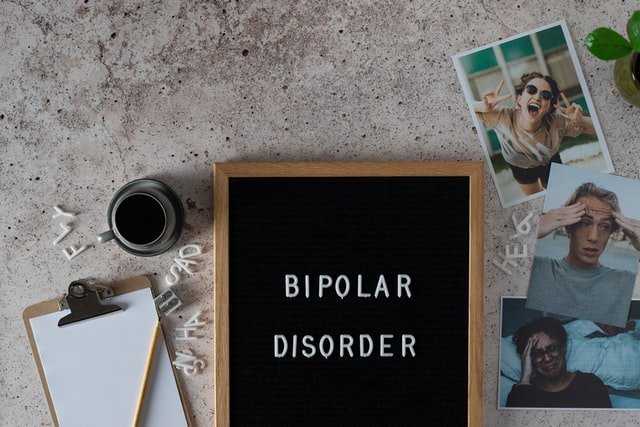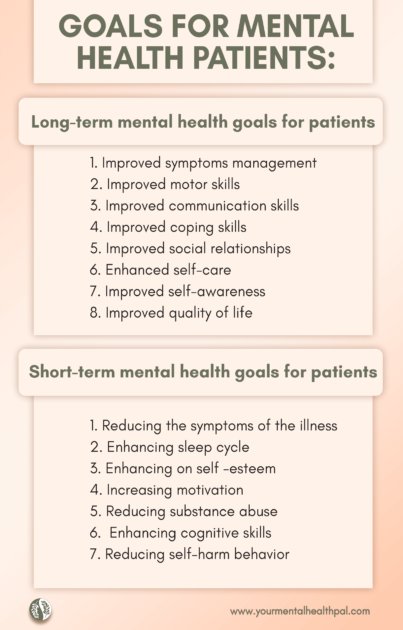The journey toward mental health treatment is not always easy. But this journey can change your life completely. It can help you get happier, healthier, and more satisfied.
And what’s the most important part of this journey?
Setting goals.
These goals for mental health will guide you, help you overcome your fears, and discover your inner strengths. They help you to heal and grow.
There are many goals for mental health patients that can help them take action for a better version of themselves.
So let’s dive in and understand why and how to set goals for mental health.

Why do mental health patients need to set goals for themselves?
During mental health treatment, health professionals set certain goals for their patients to improve their mobility, health, cognitive function, and ability to complete daily tasks and to make them feel better. In such a case, if the patients don’t actively set goals for themselves, these clinical treatments may not be effective.
So to stay motivated and involved in the treatment plan, a patient can also set long-term or short-term goals for mental health. This will help them develop confidence that they are capable of doing things. Learning various mental health activities can also help them analyze their failures and improve.

What mental health goals can a patient set?
When it comes to goal setting, it depends entirely on what treatment you are going for. These goals can be long-term or short-term. Your goals for mental health can help you stay motivated and give you a clear vision. You can also easily communicate with your healthcare providers about what you aim for from this treatment plan.
This can make your journey less overwhelming and keep you calm and stress-free. You should remember that these goals for mental health should not strain you. They should be achievable and specific. You should always appreciate yourself when you achieve your goal.
Let’s discuss some of the long-term and short-term mental health goals:
Long-term mental health goals for patients
Your long-term mental health goals are a direction toward the bigger picture of your treatment. They help you understand what you are aiming to achieve out of this treatment at the end. They help you have an effective treatment plan.
Here are some of the long-term goals for mental health patients.
1. Improved symptoms management
The first and essential long-term goal for mental health patients in therapy is to work on their symptoms. At the end of the treatment, you should be able to understand your symptoms better and learn ways to regulate your emotions better.
These emotions should not affect your daily life. At the end of the treatment, you may be able to learn various coping mechanisms that are healthy for both your body and mind.
2. Improved motor skills
Some mental health illnesses can affect the motor skills of an individual. In such cases, the treatment includes extensive treatment of bodily movement and daily activity that a patient needs to perform independently.
The tasks are divided into smaller sections, ultimately giving more tough and complex tasks. In such a case, as a patient, your long-term goal should be to enhance all your motor skills to help you function easily without the help of anyone.
3. Improved communication skills
Communication is another aspect that is affected during a mental illness or disorder. Therapy treatments help improve communication by working on communication patterns and vocal exercises.
Here the long-term goal you can set is to improve communication skills and communicate feelings and thoughts without interruption. You feel comfortable talking to people and engaging in conversation.
4. Improved coping skills
Your usual techniques and routines for coping with, solving, or processing your emotions are referred to as coping skills. Your long-term goal can be improving your coping skills in a positive direction.
Mental health issues can make you prone to unhealthy coping mechanisms like substance abuse and self-harm. Therapy treatments will help you learn various coping techniques and relaxation methods like meditation, grounding techniques, etc.
5. Improved social relationships
Social relations are adversely affected during a mental illness or disorder. You might not have the patience or the energy to talk or indulge with people.
Angry outbursts or sudden rage can be symptoms of mental health disorders that can cause restrain social relationships. Your long-term goal can be being comfortable to be socially active and engaging in relationships, be it, family or friends.
6. Enhanced self-care
Mental health issues can affect the ability to care for yourself. You might neglect your mental as well as physical well-being. This can worsen the symptoms and cause you more stress or frustration.
Your long-term goal can be learning and enhancing self-care activities both for your mental and physical health. Self-care activities will help reduce the symptoms and make you feel better about yourself.
7. Improved self-awareness
Understanding your emotions and recognizing them can be a challenging task. Initially, it can be difficult to be aware of your emotions. Your long-term goal can be to increase self-awareness, interpersonal skills, and emotional regulation.
This will help increase your self-esteem and positivity toward your life. This will help you find a deeper meaning in your life.
8. Improved quality of life
The ultimate goal of mental health treatment is to feel better and to live a happy life. If you can regulate yourselves and your emotions better, develop healthy coping skills, be able to take care of yourself, and work on your symptoms, you’ll be happy and satisfied.
Short-term mental health goals for Mental Health Patients
Once you have set your long-term goal, now you need to take small steps towards them. These small steps are your short-term goals for mental health. They provide you with immediate focus and direction that you need to achieve in a short time. Short-term goals help you track your progress and give feedback.
Here are some of the short-term goals for mental health patients:
1. Reducing the symptoms of the illness
When a treatment plan starts, the foremost goal for the patient is to reduce the symptoms and feel better. In the initial days of the treatment, mental health professionals prescribe medication or other therapy techniques that will help you ease the discomfort.
If you can reduce and control your symptoms, you can slowly be able to cope with them better.
2. Enhancing sleep cycle
Another short-term goal can be working on your sleep cycle. When it comes to mental health, sleep is essential. If you do not have a good sleep schedule, your treatment might not be effective.
You can practice yoga or meditation to achieve that proper sleep cycle. Setting a fixed time to sleep and a fixed time to wake up will help you feel relaxed and stress-free and ease your discomfort.
3. Enhancing on self -esteem
Mental health issues can make us develop negative self-talk. This can worsen your symptoms because you might not have the urge to take care of yourself. Loving yourself is essential when it comes to mental health. You can set your short-term goal to say one positive affirmation to yourself that will motivate you throughout your day.
You can also write 10 things you love about yourself in your journal. You can also start practicing self-care activities.
4. Increasing motivation
Short-term goals for mental health also include activities that will help you increase your motivation. Dealing with mental health issues and treatment can be challenging. And during such tough times, our bodies and mind don’t cooperate. You might not be motivated to get out of bed, eat, meet people, or spend time with your family.
In such a situation, a dose of motivation can be really helpful. You can try listening to podcasts, saying positive things to yourself, and appreciating your achievements. This will help you feel motivated and increase your confidence.
5. Reducing substance abuse
Mental health issues can sometimes lead to unhealthy coping mechanisms. It can give you temporary relief, but if you develop an addiction to it, it can be very harmful to your mind and body. So if you are trying to reduce using these sedative substances, you can set your goal to reduce the amount of consumption and then stop it entirely.
Don’t try and stop it in a day; it can lead to withdrawal syndrome. You can also join groups that help you sober up, and you can find your support there. Take your time, and gradually, you’ll be able to reduce substance abuse.
6. Enhancing cognitive skills
Improving cognitive function is essential to treat mental health disorders or illnesses. Practicing different therapies like cognitive behavioral therapy (CBT) can help boost your brain function. Cognitive skills can be enhanced slowly with constant practice. Make it your goal to practice at least once a day.
This will help you get better faster. Enhancing cognitive skills allows you to perform better, think better, and feel better.
7. Reducing self-harm behavior
Mental health issues can lead to negative thoughts, feelings, and self-harm behavior. Sometimes the symptoms can get worse, making you tired, frustrated and helpless, which can lead to thoughts of self-harm, thinking that it would solve everything. In such cases consulting to a mental health professional is very important.
They can help you reduce negative behavior and develop healthy coping skills. You can take your time, and don’t be hard on yourself.
There’s no ‘should’ or ‘must’ in setting goals
These were some of the long-term and short-term goals a mental health treatment patient can try to recover from mental disorders and illnesses. But remember one thing; there’s no should and must in setting these goals for mental health. You don’t have to say to yourself that you should d this or you must reach a goal. It’s about developing at your own pace.
Do what you are comfortable with, and don’t strain yourself. You should feel good about your treatment and therapy sessions to keep you motivated. Be proud of yourself and appreciate your achievements; you’ll get better with time.
Takeaway:
Mental health patients struggling with mental health issues can find it challenging to stay motivated and find the ultimate purpose of their life. These goals for mental health can help them set a direction and hope in their journey. The journey in mental health can be filled with obstacles and setbacks. Achieving these goals for mental health patients can be an emotional experience.
These were some of the goals for mental health patients, similarly, there are mental health goals that anyone can incorporate into their lives for their mental well-being. To know more, click here.
To know more about mental health and issues, subscribe to Your Mental Health Pal.

